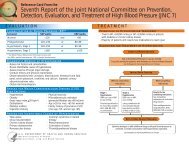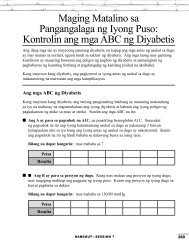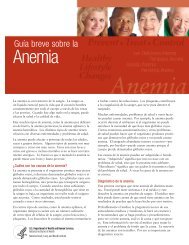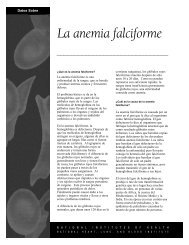WOMEN 'S HEALTH AND MENOPAUSE : - National Heart, Lung ...
WOMEN 'S HEALTH AND MENOPAUSE : - National Heart, Lung ...
WOMEN 'S HEALTH AND MENOPAUSE : - National Heart, Lung ...
You also want an ePaper? Increase the reach of your titles
YUMPU automatically turns print PDFs into web optimized ePapers that Google loves.
4.2.1 Lifestyle<br />
• At each visit, reinforce nonsmoking status, or<br />
strongly encourage patient (and family) to stop<br />
smoking and avoid secondhand smoke. Prescribe<br />
counseling, nicotine replacement, or other<br />
pharmacotherapy as indicated in conjunction<br />
with behavioral therapy or a formal smoking<br />
cessation program.<br />
• Encourage a minimum of 30 minutes of moderate-intensity<br />
dynamic exercise, e.g., brisk walking,<br />
at least 3 days a week,<br />
Women with supplemented by an increase<br />
in daily lifestyle activities.<br />
diabetes …<br />
Women who want to do more<br />
have a two- than the minimum should be<br />
to fourfold<br />
encouraged to do so.<br />
Recommend medically super-<br />
increased risk vised programs for women<br />
of MI …<br />
who have had a recent MI or<br />
revascularization procedure.<br />
• Encourage gradual weight loss for overweight<br />
women through a combination of physical<br />
activity and portion control, healthy food choices,<br />
and recognition of triggers to overeating.<br />
Refer to weight loss support group or formal<br />
nutritional counseling when appropriate.<br />
• Encourage positive coping mechanisms for<br />
stress (e.g., substitute physical activity for<br />
overeating or smoking in response to stressful<br />
life situations).<br />
4.2.2 Diet<br />
• Encourage a well-balanced and diversified eating<br />
pattern that is low in saturated fat and high<br />
in fresh fruits and vegetables and fiber. Prefer<br />
fats with higher monounsaturated content (e.g.,<br />
olive oil, canola oil). Prefer seafood and skinless<br />
chicken to red meat. Prefer soft unsaturated<br />
margarine to hard margarine or butter. Use skim<br />
milk and skim milk products or at most 1 percent<br />
milk instead of products with a higher fat<br />
content. Limit the intake of high-cholesterol<br />
foods, avoid fast-food meals. Consume more<br />
than five servings of fruits and vegetables daily.<br />
Total dietary fiber intake from food should be<br />
25–30 g per day.<br />
• Aclinical trial showed that eating fish two to<br />
three times per week reduced the risk of CVD.<br />
• Encourage increased dietary consumption of<br />
omega-3 fatty acids.<br />
• Aclinical trial showed that a “Mediterranean<br />
diet,” supplemented with alpha-linoleic acid,<br />
significantly reduced the risk of recurrent coronary<br />
events in patients with heart disease.<br />
• Diets rich in antioxidant vitamins (i.e., nuts,<br />
fruits, and vegetables) are preferred over vitamin<br />
supplements.<br />
• Limit salt intake to 6 g per day. A reduced<br />
salt/reduced saturated fat diet has been shown to<br />
reduce blood pressure in clinical trials.<br />
• Prefer spices to salt in food preparation. Reduce<br />
intake of canned and commercial bakery goods,<br />
which are usually high in salt.<br />
• Limit alcohol to less than one to two glasses per<br />
day: one glass equals 4 ounces of wine (approx.<br />
120 mL), 12 ounces of beer (approx. 360 mL), or<br />
1 1 /2 ounces of 80-proof spirits (approx. 45 mL).<br />
4.2.3 Pharmacotherapy<br />
Blood pressure<br />
• Achieve and maintain blood pressure < 140/90<br />
mmHg or lower if tolerated. If blood pressure<br />
remains above 140/90 mmHg after 3 months of<br />
reduced dietary salt, saturated fats and attempted<br />
weight loss, or if initial level is above 160/100<br />
mmHg, initiate individualized pharmacotherapy.<br />
Goal blood pressure < 130/80 mmHg if diabetic.<br />
Beta-blockers, low-dose diuretics, and<br />
angiotensin converting enzyme inhibitors have<br />
been shown in clinical trials to reduce the risk<br />
of MI in patients with high blood pressure.<br />
281
















